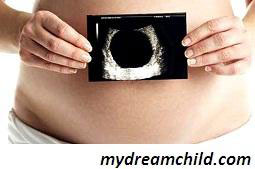What is a blighted ovum?
A blighted ovum, is a term to explain an empty gestational sac. This type of pregnancy can also be called an anembryonic pregnancy because a woman is fully pregnant but without an actual embryo. An egg is fertilized, prompting the body to pave the way for a baby by pumping out pregnancy hormones and forming the gestational sac, but for some reason, the egg never develops into an embryo. This leaves the woman with a fully formed gestational sac, all the symptoms of pregnancy—such as a positive pregnancy test, missed period, morning sickness and sore breasts—but no developing embryo.

What causes it?
A blighted ovum may result from a poor-quality sperm or egg, or it may occur due to abnormal cell division. But in many cases, an anembryonic pregnancy is caused by a chromosomal abnormality. Unfortunately, though, there isn't always a clear explanation. What we do know, however, is that they are very common.
Symptoms Of Blighted Ovum
A blighted ovum feels similar to a normal pregnancy, even after the fertilized egg has stopped growing. That’s because the body — sensing something has implanted into the uterus — can keep acting like there’s a growing embryo there, producing hormones and causing early pregnancy symptoms. But a couple less normal signs can point toward a possible blighted ovum:
Symptoms Of Blighted Ovum
A blighted ovum feels similar to a normal pregnancy, even after the fertilized egg has stopped growing. That’s because the body — sensing something has implanted into the uterus — can keep acting like there’s a growing embryo there, producing hormones and causing early pregnancy symptoms. But a couple less normal signs can point toward a possible blighted ovum:
- Heavy bleeding, similar to your period (some bleeding can be normal early in pregnancy, but heavy bleeding is worth a trip to see your healthcare practitioner)
- Severe cramping (this can also point to other pregnancy complications, including an ectopic pregnancy, so make sure to get checked out)
- An ultrasound at 7 weeks gestation showing an amniotic sac but no embryo
How Common Is A Blighted Ovum?
Because this condition occurs so early in the pregnancy, not all cases are diagnosed ,which makes it difficult for experts to come up with an exact estimate of how often blighted ovum occurs. But around 20 percent of all pregnancies end in miscarriage, and 80 percent of those happen in the first 12 weeks. Experts estimate that a third of even earlier miscarriages,those before 8 weeks gestation are due to blighted ovum.
How Is It Diagnosed?
A blighted ovum can only be diagnosed with an ultrasound, because only an inside peek at your uterus can reveal that a fertilized egg hasn’t developed into an embryo.
How Will It Affect My Odds Of Conceiving Again?
Although a blighted ovum can be a heartbreaking end to what you hoped was a healthy pregnancy, here’s the good news: one blighted ovum won’t affect your odds of conceiving again.
How Can I Prevent Blighted Ovum?
Because blighted ovum is so common, and one of the leading causes of miscarriage, there is not much you can do to prevent this from happening. It is the body’s way of singling out the best viable egg and sperm connection, to ensure you have the healthiest baby and pregnancy possible. It is one of our bodies checks and balances. That being said, I know that does not take away the pain caused by pregnancy loss. What you experience through miscarriage is very real and can be very difficult to go through. Most times a blighted ovum is a one time occurrence and a woman will go on to have a successful pregnancy.Support Healthy Eggs and Sperm, Prior to PregnancyThere are key components to consider when preparing for pregnancy, some of these may help to prevent blighted ovum. Ensure that you have the healthiest eggs and sperm possible, prior to conception. Poor quality eggs and sperm are known to cause chromosomal abnormalities, including birth defects in babies that develop full term, and increase incidence of miscarriage.If you have recently had a miscarriage it is important to work on preparing your body for pregnancy, 3 months prior to conception. Both eggs and sperm renew about every 90 days. Changes you make today will impact the egg and sperm that will be used 3 months from now. Wait for 3 months after your miscarriage before trying to conceive again. This will give you the time to prepare, while increasing chances of a successful pregnancy.Both Men and Women will benefit from these important tips. The best ways to increase your chances of successful pregnancy and reduce incidence of blighted ovum are…
- Proper preparation for pregnancy by both partners can reduce possibility of miscarriage.
- Undergoing Panchkarma treatments before conception is useful.
- Try to include black gram, nuts, complex carbohydrates, ghee, sesame oil, banana, milk, green leafy vegetables, fiber, curd, dates.
- Avoid excess caffeine, salt, sugar and oil.
- Try to keep your weight under control
- Yogasanas like Matsyasana, Dhanurasana, Vajrasana, Padmasana,Uthithapadasana, Bhujangasana, Utkadasna, Paschimottasana, Padahastasana, Gomukhasana, Janushirasana are beneficial for the reproductive organs
- Meditation and Pranayam will help to reduce your stress and will help to improve the general well being.
- You can take Saptasara Kasayam - 15ml with 60 ml of warm water which will cleanse and will help to improve the quality of the eggs. You can take Asokarist, Fala grita and Satavari lehyam after your uterus is cleaned which will help to strengthen the uterus.Your husband can take Sukrajanan and Shukrasodhan tablets for 3 months and can be reviewed.